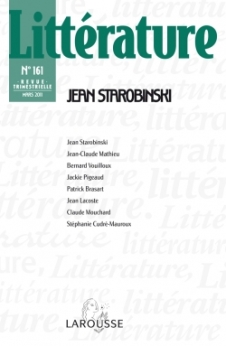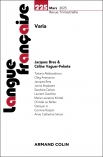
Littérature n° 161 (1/2011)
Pour acheter ce numéro, contactez-nous
Recevez les numéros de l'année en cours et accédez à l'intégralité des articles en ligne.
Peu nombreuses, mais significatives, sont les références à Goethe dans l’oeuvre de Jean Starobinski, qui semble accorder à ce dernier une « autorité » particulière, en particulier dans la confrontation avec Rousseau. L’auteur de Werther n’incarne-t-il pas d’abord le spleen surmonté et maîtrisé ? Mais plus largement Goethe écrit à un moment historique décisif, où les sciences modernes, qui « désenchantent » le monde, divorcent de la littérature, à qui échoit désormais la mission de rendre compte de « l’expérience intérieure ». C’est dans ce cadre que Starobinski élabore son « histoire sémantique » des notions médicales comme la mélancolie. Ce faisant, il propose aussi une autre image de Goethe : non plus le porte-parole de la raison classique, mais le poète qui, dans Faust, fait sa part à l’ombre.
Few, but significant, are the references to Goethe in Starobinski’s work, which seems to grant the latter a specific “authority”, in particular in the confrontation with Rousseau. Doesn’t the author of Werther first and foremost personify spleen, overcoming and keeping under control ? But more broadly Goethe writes at a crucial historical juncture, when modern science, which “disenchants” the world, is divorcing from literature, which will henceforth have the mission of rendering our “inner experience”. This is the context in which Starobinski developed his “semantic history” of medical notions such as melancholy. In doing so, he also suggests another image of Goethe: no longer classical reason’s banner boy, but the poet who, with Doctor Faustus, gives darkness its due.

